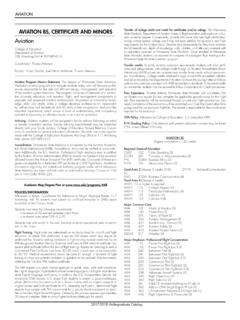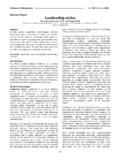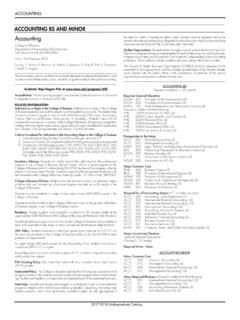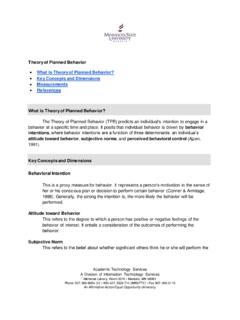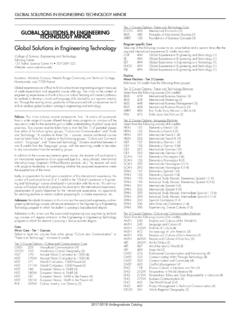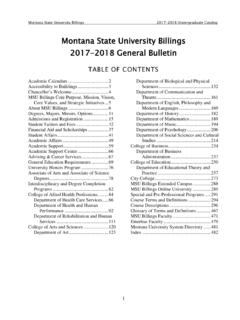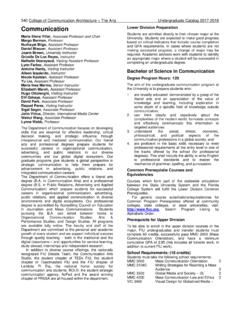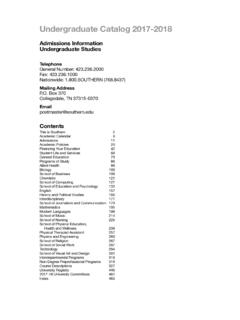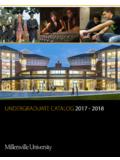Transcription of psychology - Minnesota State University, Mankato
1 2017 - 2018 undergraduate catalog psychology_____Psychology Bs and Minor_____psychologyCollege of Social & Behavioral SciencesDepartment of Psychology103 Armstrong Hall 507-389-2724 Website: : Andi LassiterFaculty: Bradley Arsznov, Jeffrey Brown, Jeffrey Buchanan, Kristie Campana, Elizabeth Fillion, Kevin Filter, Daniel Houlihan, Rosemary Krawczyk, Moses Langley, Karla Lassonde, Carlos Panahon, Lisa Perez, Shawna Petersen-Brown, Daniel Sachau, Eric Sprankle, Emily Stark _____Psychology is the scientific study of the effects of individual, social, physiological, developmental, and environmental factors on thoughts, feelings, and behavior. Psy-chology courses seek to teach students about the methods of psychological inquiry and the findings of psychological study psychology because they wish to prepare for a professional career as a psychologist or social scientist, because they are planning a career in which the understanding of human behavior is important, or simply because they wish to develop a greater understanding of themselves and others.
2 The practice of psychology at the professional level requires a graduate degree beyond the bachelor s degree. _____academic Map/degree Plan at #allPoliciEs/inForMaTionAdmission to Major is granted by the department. Department admissions re-quirements are: a minimum of 32 earned semester credit hours. a minimum cumulative GPA of completion of PSYC 201 (Statistics) with a grade of C- or better. Contact the department for application procedures. Residency Requirement. All majors must complete 28 of the required 40 credits within the Department of psychology at Minnesota State university , Mankato The department will not accept transfer courses at the 200-level for our major restricted electives, except in a case by case basis. gpA polic y. Any psychology course in which a grade of less than C- (or P) is earned will not be counted toward a major or minor in psychology . Teaching psychology . Students who intend to gain initial licensure to teach psy-chology in Minnesota schools need to meet the requirements of the social studies BS (teaching) program as described in the Social Studies section of this BsDegree completion = 120 creditsprerequisites to the Major PSYC 101 Introduction to Psychological Science (4)Choose one course.
3 (choose 4 credits)MATH 112 College Algebra (4)STAT 154 Elementary Statistics (4)Major common core PSYC 201 Statistics for psychology (4)PSYC 211W Research Methods and Design (4)PSYC 409 History and Systems (4)Major Restricted Electives Choose one course from each of the four areasBiological (choose 4 credits) PSYC 321 Brain and Behavior (4)PSYC 413 Sensation & Perception (4)PSYC 420 Psychopharmacology (4)PSYC 421 Behavior Neuroscience (4)PSYC 425W Behavior Genetics (4)Cognition (choose 4 credits)PSYC 325 Introduction to Cognitive psychology (4)PSYC 414 Learning (4)PSYC 415 Human Memory (4)Developmental (choose 4 credits) PSYC 343 Introduction to Developmental psychology (4)PSYC 433 Child psychology (4)PSYC 436 Adolescent psychology (4)PSYC 466 psychology of Aging (4)Social/Cultural (choose 3-4 credits)PSYC 340 Social psychology (4)PSYC 358 Cultural psychology (4)PSYC 455 Abnormal psychology (4)PSYC 460W psychology of Women (3)Major Unrestricted Electives Choose 12 - 13 Credit(s).
4 Choose from any psychology courses not previously 102 - 499 Required Minor: yes. MINoRcorePSYC 101 Introduction to Psychological Science (4)Elective Choose 17 credits of elective courses in psychology , including at least 8 upper-level credits (300- or 400-level). ExpERIMENTAl psychology cERTIfIcATEThe purpose of this certificate is to provide undergraduate students with hands-on research experience in psychology . psychology majors who are considering applying to graduate school are highly recommended to complete this : Students must earn a grade of C- or better in all certificate courses for that course to count towards the certificate. No more than 4 credits in the certificate may be taken for P/N Requirements: Students must meet requirements of admission to the psychology major in order to complete this certificate. This includes completion of Psy 201 (Statistics) with a grade of C- or above, a cumulative GPA of and above, and at least 30 earned credits at the college general Education PSYC 101 Introduction to Psychological Science (4 )Major common core PSYC 201 Statistics for psychology (4) PSYC 211W Research Methods and Design (4) PSYC 496 Laboratory Research in psychology (2) Major Restricted Electives Choose 2 courses, 7-8 credits, from the list below.
5 PSYC 419 Psychometric Theory (4) PSYC 423 Cognitive Neuroscience (4)PSYC 430 Advanced Topics in Biological psychology (4) PSYC 443 Advanced Social psychology (3) PSYC 450 Advanced Cognitive psychology (4) _____coUrs E dEscriPTionspsyc 101 (4) Introduction to psychological scienceThis course is designed to provide a thorough introduction to the broad spectrum of theories and applications that make up the field of , SpringGE-5psyc 103W (3) psychology TodayIntroduces students to major issues in society that impact their lives, behaviors, and the way they think. Course requires student to critically address controversial and non-controversial issues through clear argumentations, intensive writings, research and Demand: Fall, SpringWI, GE-2 2017 - 2018 undergraduate catalog psychology coNTINUE dpsyc 201 (4) statistics for psychology1.) Learn the importance of statistics for understanding human behavior. 2.) Apply basic statistical concepts to questions about human behavior.
6 3.) Conduct basic statistical tests and make inferences about human behavior. 4.) Prepare students in the psychology major to take PSYC 211-Research Methods and Design. Prerequisite: MATH 112 or STAT 154 Fall, Springpsyc 202 (1) careers in psychologyExploration of various degrees and types of careers available in psychology , and what psychologists , Springpsyc 205 (3) psychology of sexual healthAn overview of the psychological aspects of sexuality including the assessment and treatment of sexual disorders, gender development and identity, sexual orientation, behavioral effects on sexual health, and sexual offending and psyc 206 (4) Introduction to cognitive science This course introduces a multidisciplinary approach to the scientific study of cog-nition. Contributions from the fields of biology, computer science, neuroscience, philosophy, and psychology are emphasized. Topics include the mind-body problem, perception, memory, linguistics, problem solving, artificial intelligence, and robotics.
7 This course is a prerequisite for the cognitive science major. For the psychology major, it serves as unrestricted elective credit; it does not satisfy the cognitive restricted elective requirement. On Demand: Fall, SpringGE-5psyc 211W (4) Research Methods and designAn introduction to the major components of research methodology in psychology . This is a writing intensive course and involves the processing, interpretation, and exposition of behavioral : Must have a minimum total cumulative GPA of or instructor permission to enroll; PSYC 201 Fall, SpringWIpsyc 230 (3) child care psychologyThis course is designed to develop an understanding of major variables that impact the psychological development of children. Emphasis will be placed on what parents and other care givers can do to maximize the healthy psychological development of their , SpringDiverse Cultures - Goldpsyc 240 (3) personal AdjustmentUnderstanding oneself and increasing one s satisfaction in , Springpsyc 291 (1-4) Tutoring psychologyApplication of the principles of learning to the instruction of required.
8 Prerequisite: PSYC 101 Fall, Springpsyc 303 (3) Introduction to clinical psychologyThis course is designed for psychology majors who plan careers in professional psychology (clinical, school, etc.). The purpose of the course is to assist students in developing the skills necessary to compete for graduate school placement. It is advised that students complete this course during their sophomore or junior 304 (2) Introduction to school psychologyThis course is designed to introduce students to school psychology . The course will broadly address prominent topics in the field as well as assist students in deciding on graduate school and career 321 (4) Introduction to Brain and Behavior This course will introduce students to the relationship between the structure and function of the nervous system to the underlying biological processes of : PSYC 201 Fall, Springpsyc 325 (4) Introduction to cognitive psychologyExplores the scientific study of human cognition and provides students with broad coverage of the mental processes used to acquire, process, and retain knowledge.
9 Students will examine basic concepts and research findings in topics of human cogni-tion such as perception, attention, memory, reading, and problem solving. Concepts in Cognitive psychology will be related to everyday behaviors and : either Psy 101 OR Psy 206, not bothOn Demand: Fall, Springpsyc 340 (4) Introduction to social psychology An exploration of theories and research related to the ways that the social environ-ment affects people s : PSYC 101 Fall, Springpsyc 343 (4) Introduction to developmental psychologyThis course examines changes in human behavior over the entire lifespan from conception to death. Topics cover developmental changes in physical, cognitive, and social domains. Traditional theories are integrated with current findings of developmental : PSYC 101 On Demand: Fall, Spring, Summerpsyc 358 (4) Introduction to cultural psychology Cultural psychology is an interdisciplinary field that unites psychologists, anthropol-ogists, linguists and philosophers to study how cultural meanings, practices and institutions influence and reflect individual human psychologies.
10 Cultural influences on cognition, perception, emotion, motivation, moral reasoning, and well-being will be discussed with a view towards understanding divergent mentalities by drawing primarily from studies comparing Eastern and Western cultures, as well as some ethnic group companions within the United states . Students should come out of this course with an appreciation for the capacity for humans to create psychological Demand: Fall, Spring psyc 363 (4) Introduction to Industrial/organizational psychology An examination of the psychological aspects of human behavior in the work place. Topics include history of Industrial/Organizational psychology , job analysis, performance measure-ment, predictors of performance, making personnel decisions, training, satisfaction, social per-ception, motivation, communication, group process, leadership, and organizational Demand: Fall, Spring, Summerpsyc 389 (3) psychology and the lawThis course will introduce you to specific psychological theories and research that have been applied to the United states legal system.
